Exploring Pharmacy Workforce Shortage Solutions

How Pharmacy Technician Training Can Ease Staffing Shortages
Two out of three hospitals and health systems report that they’ve been unable to run at full capacity during the last year due to staffing shortages.1 To make matters worse, there’s no indication these shortages will end anytime soon.2
Discussions surrounding a lack of adequate healthcare workers often revolve around the roles of physician and nurse. However, many pharmacies are also facing a critical shortage of qualified professionals in pharmacy technician roles, requiring that we explore potential solutions.
The Pharmacy Technician Shortage
Many of the nation’s pharmacies are dealing with a pharmacy technician shortage.
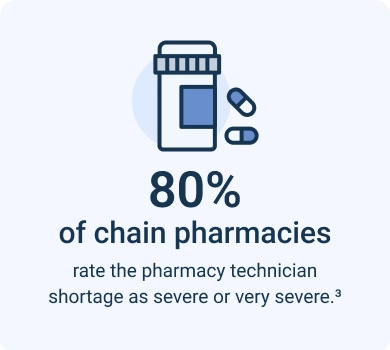

A 2022 national survey conducted by the American Society of Health-System Pharmacists (ASHP) revealed that 74% of pharmacists faced a shortage of pharmacy technicians in entry-level roles.3 This adds to data collected in the ASHP’s 2021 survey, which indicated that the turnover rate for pharmacy technician positions was somewhere between 21% and 30%4
A 2023 survey of health system pharmacy leaders further reported that the pharmacy technician role was the most understaffed position in both hospital and commercial pharmacy settings, with 81% and 62% reporting understaffing respectively.5
What’s Behind Pharmacy Technician Shortages?
Several factors contribute to pharmacy technician shortages. They include:
- Reduced supply. Vacancy rates for pharmacy technician positions increased from 6% to 21% in a 3-year period, more than tripling in number.6 When the talent pool is shallow, healthcare organizations can face difficulties filling open positions.
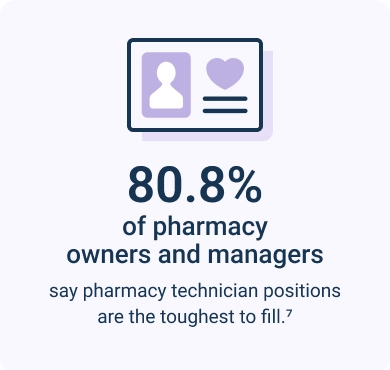

- Increased demand. Pharmacy technician employment is projected to increase 6% between 2022 and 2032 according to the BLS, with 44,900 new positions expected annually.8 Employers will need to find trained professionals to fill these additional positions.
- High worker burnout. Pharmacy technicians are feeling burnt out, with prevalence estimates ranging from 28.3% to 36.4% depending on the type of setting in which they work.9 Burnout is associated with a higher intent to leave one’s employment.10 The more workers that leave their jobs, the greater the shortage.
What’s the Solution? Pharmacy Technician Training
Despite healthcare organizations offering a variety of incentives to promote recruitment and retention of pharmacy technician staff, a shortage of workers still exists. We propose that the solution to a lack of workers in these positions involves providing current employees and new hires with access to an employer-sponsored pharmacy technician training course. This strategy offers healthcare employers several benefits.
Increased Supply
If you find it difficult to get enough qualified applicants for open pharmacy technician positions, providing training for this role can broaden the hiring pool. Some people might want to pursue a pharmacy technician role but lack the funds to take training on their own. Others may not have previously considered a technician position, but become interested once they’re offered training through their employer. In both cases, giving them access to pharmacy technician training can increase your supply of qualified pharmacy technicians, reducing this workforce challenge.
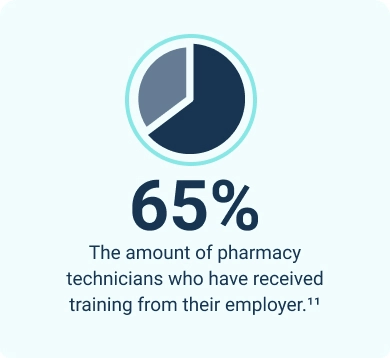

Reduced Burnout
One of the many causes of burnout is a heavy workload. Training employees and new hires to perform pharmacy technician functions can provide a pipeline of professionals who are able to handle this work, spreading it among a higher number of employees.
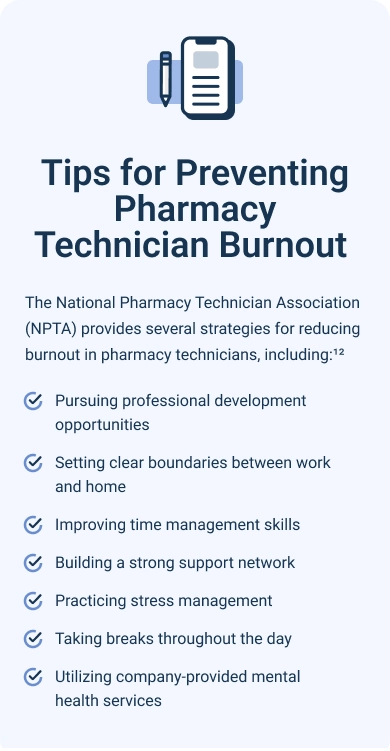
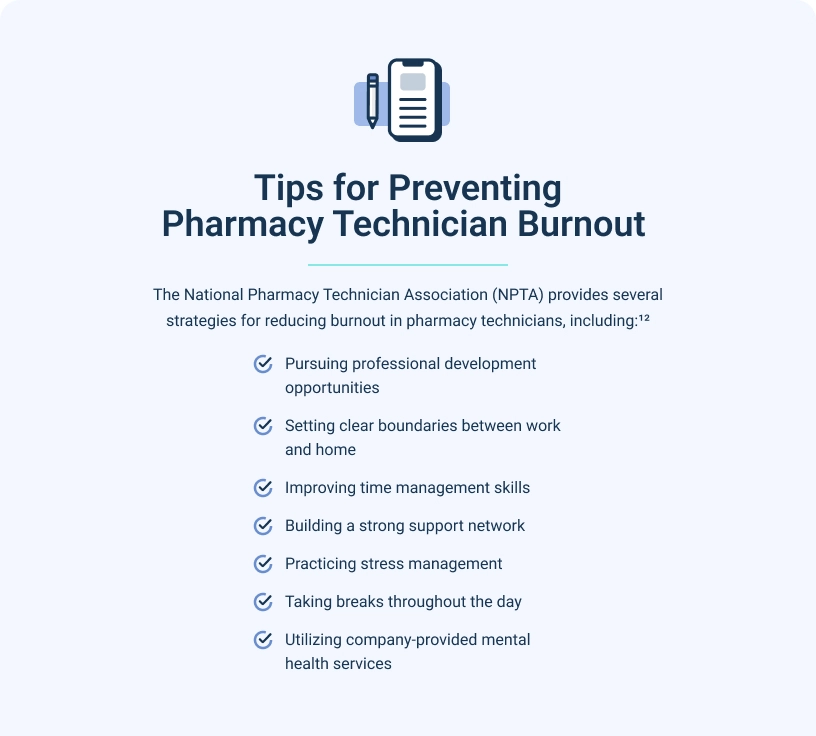
Improved Worker Retention
Offering staff access to training opportunities also helps boost employee retention.13 Some staff members may want training to learn how to perform their jobs more effectively or efficiently. Others might work in a different role but would love to transition into a pharmacy technician position. Providing both types of staff access to the training that helps them achieve their career goals can make them want to stay with your organization versus seeking a job with another healthcare company that offers this opportunity.
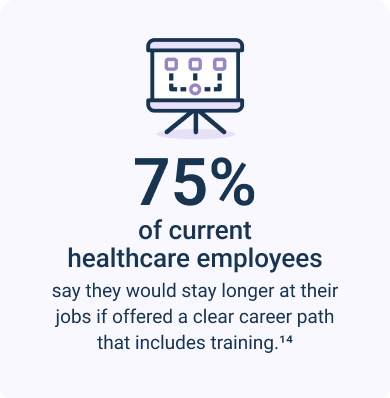

Importance of Training that Includes Certification Prep
Research conducted by the Pharmacy Technician Certification Board (PTCB) revealed that 84% of pharmacy technicians were satisfied with their roles, with 84% of respondents also having their certification.19 While the connection is unclear, employers can offer access to a pharmacy technician training course that includes certification prep.
One certification available to pharmacy technicians is the Certified Pharmacy Technician (CPhT) credential. To earn this credential, applicants must take and pass a certification exam. Nasium Training’s Pharmacy Technician training course prepares learners to sit for the ExCPT (Exam for the Certification of Pharmacy Technician) offered by the PTCB and the PTCE (Pharmacy Technician Certification Exam) offered by the National Healthcareer Association (NHA), if they meet all other eligibility requirements.15
PTCB Certification
To obtain CPhT certification through the PTCB, individuals must demonstrate their knowledge of both medication safety and effective patient care. Pharmacy Technician Certification Exam (PTCE) content areas include:16
- Medications (40%)
- Patient safety and quality assurance (26.25%)
- Order entry and processing (21.25%)
- Federal requirements (12.5%)
Individuals must complete a PTCB-recognized training program to be eligible for this certification exam or have at least 500 hours of experience in a pharmacy technician role.17
The PTCB’s exam can be taken in person or online. It consists of 90 multiple-choice questions and takes roughly 2 hours to complete.28 Unofficial exam results are provided immediately with official results posted to the individual’s PTCB account a couple of weeks later.
NHA Certification
Individuals can also pursue CPhT certification through the NHA. The topic areas assessed in the ExCPT certification test are:18
- Dispensing process (45%)
- Overview and laws (25%)
- Drugs and drug therapy (15%)
- Medication safety and quality assurance (15%)
To be eligible, applicants must have completed a pharmacy technician training program within the previous five years or have 1 year of work experience, the latter of which must include a minimum of 1,200 supervised pharmacy work hours within the previous 3 years.19
The exam consists of 100 questions and can be taken in person or online. Applicants have 2 hours and 10 minutes to complete the test,20 after which the results are posted within 24 hours.21
Nasium Training Offers Pharmacy Technician Training
Providing employees and new hires with access to pharmacy technician training is one potential strategy for addressing critical worker shortages. Whether used to upskill current pharmacy technicians, as a reskilling effort for workers in other roles, a training method for new hires, or even to receive the benefits of cross-training, this approach helps ensure that individuals in these positions have the knowledge and skills needed to perform technician functions.
Nasium Training’s online Pharmacy Technician training course can help your employees build upon or add to their current skill sets. This 24-week course covers important topics such as prescription processing and dispensing, medication quality assurance, federal regulations, and ethics.
Nasium Training has a high-value training approach that:
- Sets your employees up for greater success
- Provides learner flexibility
- Utilizes a variety of learning tools
- Offers the skills needed for both licensure and certification
How can you include Nasium Training’s Pharmacy Technician training course in your healthcare organization’s professional development plan? Let’s talk about it. Contact us today and we can share more information about what this course entails, also providing us the opportunity to discuss ways you can customize the training based on your organization’s needs.
Where national data regarding earnings or employability within a particular field are cited, individual readers should note that national averages may not accurately reflect the earnings of workers in their particular part of the country, and may include earners at all stages of their career, not just entry-level wages for recent graduates.
Training program availability varies by state. Learners must meet eligibility requirements for applicable certifications and state registrations. Course availability varies by state. Completion of this course does not fulfill eligibility requirements for certifications.
1 Kaufman Hall. 2023 State of Healthcare Performance Improvement: Signs of Stabilization Emerge. https://www.kaufmanhall.com/sites/default/files/2023-10/KH-Report_2023-State-Healthcare-Performance-Improvement.pdf
2 American Hospital Association. Fact Sheet: Strengthening the Health Care Workforce. https://www.aha.org/fact-sheets/2021-05-26-fact-sheet-strengthening-health-care-workforce
3 AACP. 2022 National Pharmacist Workforce Study. https://www.aacp.org/sites/default/files/2023-08/2022-npws-final-report.pdf
4 Chen J, Cho SL. Shortages Persist in an Evolving Profession. Pharmacy Times. https://www.pharmacytimes.com/view/shortages-persist-in-an-evolving-profession
5 McKinsey & Company. Untapped opportunities for health system pharmacies. https://www.mckinsey.com/industries/healthcare/our-insights/untapped-opportunities-for-health-system-pharmacies
6 Twenter P. Pharmacy’s most pressing issue: a technician shortage. https://www.beckershospitalreview.com/pharmacy/the-next-pharmacy-issue-a-technician-shortage.html
7 NCPA Report for Survey on Drug Shortages and Staffing, January 2023. https://ncpa.org/sites/default/files/2023-02/drug-shortage-survey-23.pdf
8 Bureau of Labor Statistics. Occupational Outlook Handbook. Pharmacy Technicians. https://www.bls.gov/ooh/healthcare/pharmacy-technicians.htm#tab-6
9 Raber H, et al. Burnout, professional fulfillment, sleep impairment, and self-compassion within an academic medical center pharmacy department. Am J Health-System Pharmacy. https://academic.oup.com/ajhp/article-abstract/79/18/1551/6611815
10 Industry Pharmacists Organization. Pharmacist Job Satisfaction and Burnout in Traditional and Non-Traditional Practice Settings. https://www.industrypharmacist.org/resources/2d739c86cc7a4e0cabcaca7825773d9f.pdf
11 PTCB. The State of the Pharmacy Technician Workforce. https://www.ptcb.org/the-state-of-the-pharmacy-technician-workforce
12 NPTA. Nurturing Mental Health and Well-Being: A Vital Guide for Pharmacy Technicians. https://www.pharmacytechnician.org/NewsBot.asp?MODE=VIEW&ID=30003
13 Biro MM. Learning or Leaving: Why Employee Development is Key to Retention. Indeed for Employers. https://www.indeed.com/lead/why-employee-development-is-key-to-retention
14 Based on 1,000 participants surveyed in the Study on Allied Health Workforce Retention commissioned by UMA Education, Inc. and ACUPOLL® Precision Research, Inc., February 3-22, 2023.
15 Learners need at least 500 hours of equivalent work experience as a pharmacy technician to be eligible to sit for these examinations. Additional licensure or registration requirements may apply, depending on the state in which the learner works. Specific eligibility will be determined by individual state requirements.
16 PTCB. Credentialing Guidelines and Requirements. Appendix C: PTCE Content Outline. https://www.ptcb.org/guidebook/ptce-content-outline
17 PTCB. Certified Pharmacy Technician (CPhT). https://www.ptcb.org/credentials/certified-pharmacy-technician
18 NHA. NHA Certified Pharmacy Technician (CPhT) Test Plan for the ExCPT Exam. https://info.nhanow.com/hubfs/Test%20Plans/nha-2016-excpt-test-plan.pdf
19 NHA: Your path to ExCPT pharmacy technician certification. https://www.nhanow.com/certification/nha-certifications/certified-pharmacy-technician-(cpht)
20 NPTA. NHA’s CPhT Certification Program. https://www.pharmacytechnician.org/npta/About_NHA_Certification.asp
21 NHA Help Center. When do I get my exam results? https://knowledge.nhanow.com/when-do-i-get-my-exam-results
